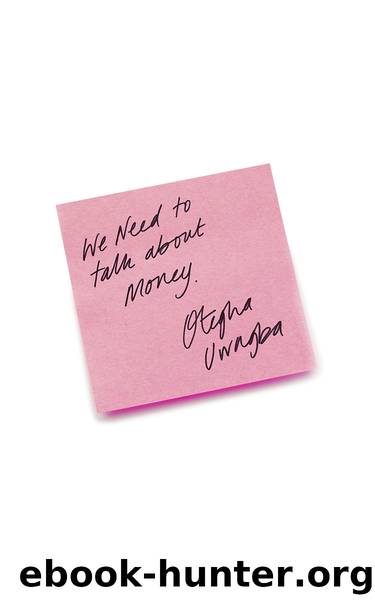We Need to Talk About Money by Otegha Uwagba

Author:Otegha Uwagba [Uwagba, Otegha]
Language: eng
Format: epub
Publisher: HarperCollins Publishers
Published: 2021-05-14T17:00:00+00:00
Chapter 7
INVISIBLE LABOUR
Today you are going to work for free. And if you donât do it today, youâll do it tomorrow. And if you donât do it tomorrow, youâll do it next week, or youâll have done it last week, or youâll do it next month.
Working for free is, unfortunately, an inescapable part of the female condition. Entire economic systems are predicated on women assuming the burden of responsibility for the constant trickle of low-level organisation and emotional caretaking that greases the wheels of life. We are the invisible worker bees holding together family units and friendship groups, global conglomerates and entire societies, and yet â in addition to being unpaid â this work, crucial as it is, is very often also unacknowledged.
This is what I call invisible labour, a term that sociologists, economists and feminists have all defined differently over time, but by which I mean to encompass the following:
Domestic labour â household chores and all the various bits of admin that go into the maintenance of a home. Paying council tax, stocking up the fridge, emailing your landlord about the broken boiler.
Caregiving â for young children, elderly relatives and other dependants.
Office housework â the low-level admin thatâs essential to office life but to which no designated employee is assigned. Ordering lunch for a team meeting (and clearing up afterwards), planning the office Christmas party, organising birthday celebrations and leaving cards.
Mental labour â which often adds another layer to all of the above. This is the âworry workâ of remembering to send thank you letters, of factoring everyoneâs dietary preferences into the weekly supermarket shop. Itâs the work of anticipating needs and making sure theyâre met, of weighing up and reminding, of creating the to-do list and keeping track of the items on it even if you donât actually have to do them all yourself.
Emotional labour â a term increasingly used as a catch-all to denote the presence of invisible labour in general, but which actually refers to the fairly specific requirement within certain jobs to keep oneâs emotions in check (more on that below).
All of the above overwhelmingly fall to women â in the instance of care work, over three quarters of the unpaid care work done globally is carried out by women, who do more than three times the amount men do.[1]
âNot only has housework been imposed on women, but it has been transformed into a natural attribute of our female physique and personality, an internal need, an aspiration, supposedly coming from the depth of our female character.â So wrote the activist and writer Silvia Federici in her radical 1975 manifesto Wages Against Housework. Federici is most well-known for arguing that women should be paid for their domestic labour, though as the writer Jennifer Schaffer observes this demand was âmore radical provocation than concrete policy proposalâ,[2] an attempt to highlight the extent to which our global economic system relies on womenâs unpaid labour. But Wages Against Housework also offers valuable insight into why the division of labour
Download
This site does not store any files on its server. We only index and link to content provided by other sites. Please contact the content providers to delete copyright contents if any and email us, we'll remove relevant links or contents immediately.
International Integration of the Brazilian Economy by Elias C. Grivoyannis(107794)
The Radium Girls by Kate Moore(12012)
Turbulence by E. J. Noyes(8014)
Nudge - Improving Decisions about Health, Wealth, and Happiness by Thaler Sunstein(7689)
The Black Swan by Nassim Nicholas Taleb(7097)
Rich Dad Poor Dad by Robert T. Kiyosaki(6595)
Pioneering Portfolio Management by David F. Swensen(6280)
Man-made Catastrophes and Risk Information Concealment by Dmitry Chernov & Didier Sornette(6001)
Zero to One by Peter Thiel(5782)
Secrecy World by Jake Bernstein(4736)
Millionaire: The Philanderer, Gambler, and Duelist Who Invented Modern Finance by Janet Gleeson(4457)
The Age of Surveillance Capitalism by Shoshana Zuboff(4272)
Skin in the Game by Nassim Nicholas Taleb(4232)
The Money Culture by Michael Lewis(4185)
Bullshit Jobs by David Graeber(4176)
Skin in the Game: Hidden Asymmetries in Daily Life by Nassim Nicholas Taleb(3986)
The Dhandho Investor by Mohnish Pabrai(3750)
The Wisdom of Finance by Mihir Desai(3726)
Blockchain Basics by Daniel Drescher(3571)
